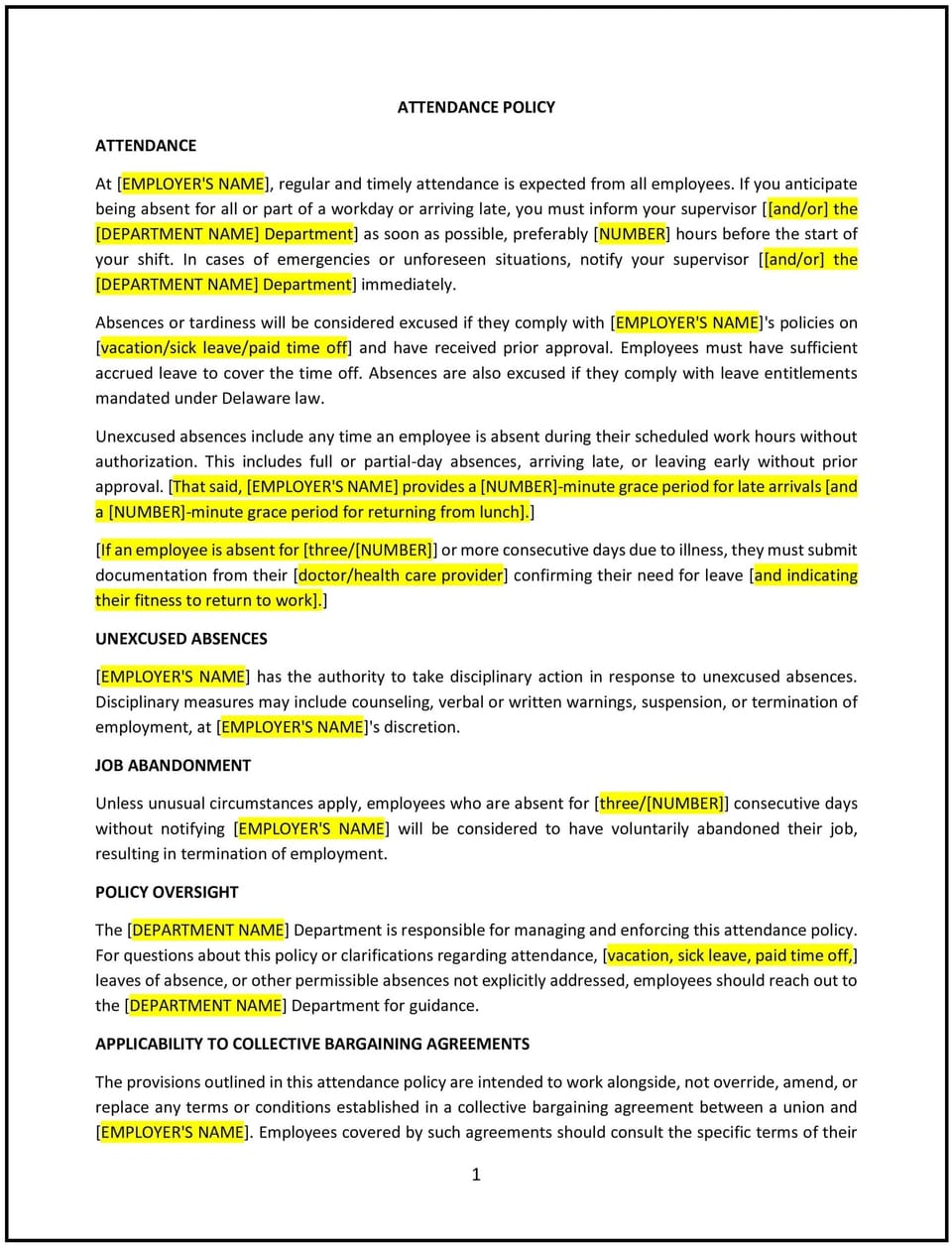Attendance policy (Delaware): Free template

Attendance policy (Delaware)
An attendance policy helps Delaware businesses set clear expectations for employee attendance and punctuality, ensuring workplace productivity and minimizing disruptions. This policy outlines guidelines for tracking attendance, managing absences, and addressing tardiness or excessive absenteeism.
By implementing this policy, businesses can maintain operational efficiency, promote accountability, and foster a positive work environment.
How to use this attendance policy (Delaware)
- Define expectations: Clearly outline attendance requirements, including work hours, start times, and expectations for punctuality.
- Specify reporting procedures: Provide instructions on how employees should report absences or tardiness, including timelines and required documentation (e.g., medical notes).
- Address leave policies: Include information on paid time off, sick leave, and other approved absences in compliance with Delaware laws.
- Establish consequences: Explain the disciplinary actions for attendance violations, such as warnings, suspension, or termination, based on the severity and frequency of issues.
- Track attendance: Implement a system for monitoring employee attendance and addressing patterns of absenteeism or tardiness.
- Communicate the policy: Ensure employees understand the policy and are aware of their responsibilities and rights related to attendance.
Benefits of using this attendance policy (Delaware)
This policy offers several benefits for Delaware businesses:
- Promotes accountability: Sets clear expectations for attendance, encouraging employees to adhere to schedules and minimize disruptions.
- Enhances productivity: Reduces absenteeism and tardiness, ensuring smooth operations and consistent team performance.
- Reduces confusion: Provides a clear framework for managing absences, addressing employee questions, and ensuring fairness.
- Aligns with legal requirements: Helps businesses comply with Delaware laws regarding leave and attendance-related practices.
- Improves morale: Promotes a culture of fairness and transparency, where attendance expectations are consistently applied.
Tips for using this attendance policy (Delaware)
- Communicate the policy effectively: Ensure employees receive and understand the policy, including their responsibilities and reporting requirements.
- Use consistent tracking methods: Implement a reliable system for tracking attendance to identify trends and address issues fairly.
- Provide support for legitimate absences: Offer resources for employees dealing with unavoidable absences, such as flexible scheduling or leave options.
- Address issues promptly: Act quickly to resolve attendance problems, providing feedback and disciplinary action when necessary.
- Review the policy regularly: Update the policy periodically to reflect changes in Delaware laws or workplace practices.
Q: Why should my business have an attendance policy?
A: An attendance policy sets clear expectations for employees, promotes accountability, and ensures consistent operations by minimizing disruptions caused by absenteeism or tardiness.
Q: What should be included in an attendance policy?
A: The policy should include attendance expectations, reporting procedures for absences or tardiness, leave entitlements, disciplinary actions for violations, and any Delaware-specific legal requirements.
Q: How should employees report absences or tardiness?
A: Employees should follow the reporting procedures outlined in the policy, which may include notifying a supervisor or HR by a specific deadline and providing required documentation, such as medical notes.
Q: What actions can a business take for repeated attendance violations?
A: The policy should outline disciplinary actions for attendance violations, such as verbal or written warnings, suspension, or termination, depending on the severity and frequency of the issue.
Q: How often should this policy be reviewed?
A: This policy should be reviewed at least annually or whenever there are updates to Delaware laws or company practices to ensure it remains effective and compliant.
This article contains general legal information and does not contain legal advice. Cobrief is not a law firm or a substitute for an attorney or law firm. The law is complex and changes often. For legal advice, please ask a lawyer.


